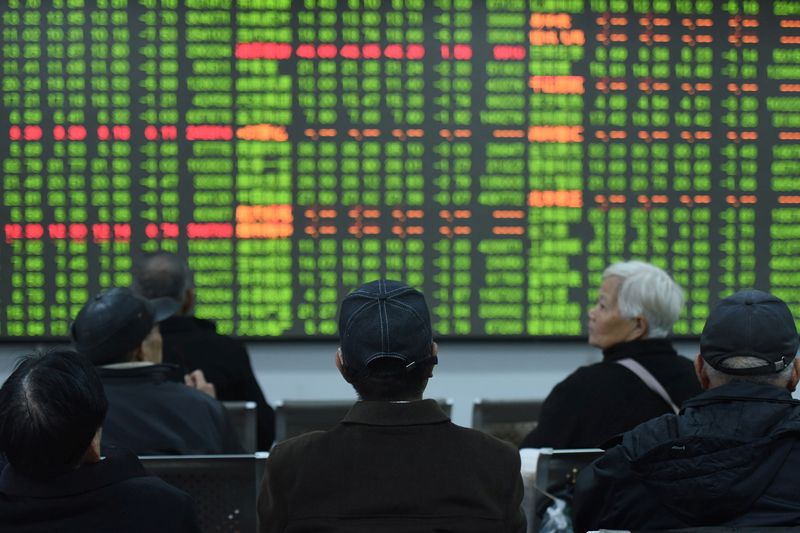(This Jan. 23 story has been refiled to correct name to Diane, not Diana, in paragraph 29)
(Reuters) - Stock markets in China and Hong Kong have slumped to multi-year lows this week as confidence in the world's second-biggest economy has evaporated and foreign money has fled, while data showed sputtering growth and deepening real estate malaise.
Here is what investors and market strategists have said about the selloff:
DERRICK IRWIN, EMERGING MARKETS PORTFOLIO MANAGER, ALLSPRING:
"Investors looking out into 2024 and anyone who would hope that the Chinese government would come riding to the rescue is re-evaluating that right now.
"Until there is a bigger crisis, the Chinese government may just continue to kind of throw cups of water on the fire instead of something big that they probably need to do.
"There is a degree of capitulation ... at this stage, markets are not being driven necessarily by spreadsheets and calculations, but more on emotion and maybe technical issues."
MARKO PAPIC, CHIEF STRATEGIST, CLOCKTOWER GROUP:
"Our argument is that at the financial work conference, which happened last week, policymakers came away with a renewed focus on financial sector regulation and the ongoing anti-corruption campaign, refocusing it towards the financial sector.
"From a Chinese investor's perspective, the reason that this matters is twofold: First of all, it's another major sector that's going to be inspected with a heavy-handed regulatory approach. And the second issue is that you need the financial sector when the private sector is de-leveraging. You need banks to want to lend ... more so than any other time.
"As a Chinese investor you (also) sit there and you're like, wait a minute, if (the central bank is) not willing to cut 25 basis points we're really far from any sort of a bazooka ... they're not even willing to fire a water pistol."
PIERRE HOEBRECHTS, HEAD OF MACRO RESEARCH, EAST EAGLE ASSET MANAGEMENT:
"We have been conservatively positioned since last March on the premise that the Chinese household would be reluctant to invest ... in light of their high savings rate and the real estate market adjustment.
"As fundamental news has not been strong enough and the market is finally waking up to the fact that the government will manage the economy for the long term as stated by Premier Li Qiang at Davos and not focus on short-term market movements, investors' interest has disappeared."
TONY ROTH, CHIEF INVESTMENT OFFICER, WILMINGTON TRUST INVESTMENT ADVISORS:
"We're picking managers that, in their own self-interest and desire to outperform, have more constructive views on other (emerging market) countries than China.
"It's a gradual process, we're not the trigger puller on the underlying allocations, they are done by our managers. If one of them is too heavily allocated to China, we might decide to allocate less into that manager."
NORMAN VILLAMIN, GROUP CHIEF STRATEGIST, UBP:
"We sold China in October. We had hoped that there was going to be more cyclical stimulus coming through. When it became clear that wasn't going to happen, the conclusion was that China was ready to embark on the restructuring of its property sector which meant that it would be kind of a fairly prolonged process.
"Over the last 30 years, the story of China has been China is growing fast, China is becoming the manufacturing centre of the world - so you should just own China because the economy is doing very well. Now, the story of China is there are some sectors that are going to have a very hard time. So you need to be more selective in terms of the companies that you buy."
JON WITHAAR, ASIA SPECIAL SITUATIONS FUND MANAGER, PICTET ASSET MANAGEMENT:
"As we understand it in China there are a wave of retail structured products termed 'snowballs' that are reaching their 'knock-in' levels, where they stop out. As we go lower, more strikes 'knock in'.
"Foreigners continue to sell (Hong Kong) and China and the national team buying we saw last week clearly didn't have the desired effect. I would expect more headlines designed to calm the market (and) stem the tide of selling."
REDMOND WONG, CHIEF CHINA STRATEGIST, SAXO MARKETS:
"The investor base in Hong Kong stocks is relatively diverse, including institutional investors that have a global or Asian benchmark. Some of these funds, particularly overseas-based funds, reportedly are reallocating investments from Hong Kong/China to Japan and other Asian markets."
WONG KOK HOONG, HEAD OF EQUITY SALES TRADING, MAYBANK:
"We are thinking the (Hang Seng) will test 14,600, the last 2022 lows. By some measures it would appear the (Hang Seng) is oversold, but no one is really talking about picking the bottom here."
MATT SIMPSON, SENIOR MARKET ANALYST, CITY INDEX:
"Reports of the rescue package has seen an evergreen question resurface; will it be enough to turn the ship around? And early market reactions suggest traders are underwhelmed, likely due to the fact the package does little to fix the actual problem."
DIANE RULKE, PROFESSOR, TEPPER SCHOOL OF BUSINESS, CARNEGIE-MELLON UNIVERSITY:
"Instead of consumers coming out of COVID restrictions spending, as happened in the United States, China's property market started to collapse ... (and people) stopped spending.
"China accounts for about 30% of global manufacturing output; it contributes about 22% of global GDP growth; people should want to invest there, but instead they're walking away rapidly."
CORIN FROST, MANAGING DIRECTOR, OCIO HELIOS:

"(There are) plenty of reasons to see (the) relative risk of China increasing.
"For U.S.-based advisors, China is likely to be as part of an (emerging market) or (all country world index) fund rather than a specific China fund. As such the direct influence of China upon plan returns is likely to be muted as U.S. based investors are generally underweight EM. The headline risk of trade spats, Taiwan conflict, slowing economy etc. would likely dampen appetite of adding to direct Chinese exposure."